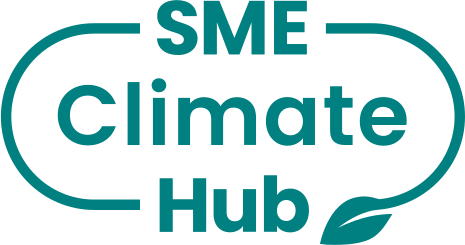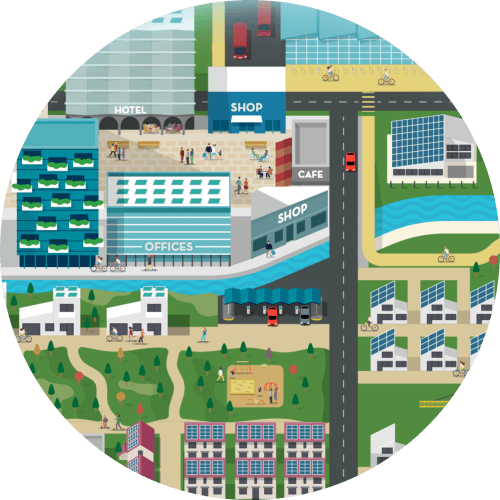اطلع على الخطوات التي يمكن لشركتك اتخاذها نحو مستقبل أكثر استدامة من خلال مواردنا المفتوحة.
Darcica Logistics Ltd's Climate Report
Introduction *
Commitment and Targets *
Own Emissions *
Value Chain Emissions *
(optional)Climate Solutions *
(optional)Governance, Strategy and Climate Risk *
(optional)Results, Challenges and Outlook *
Introduction *
1.1 End day of the reporting period
*1.1.1 Reporting year
*1.2 Describe your business activities
*1.4 Number of employees on the end day of the reporting period
*1.4.1 Full-time equivalent (FTE) or headcounts
*1.5 Is this report being submitted on behalf of a parent company or a subsidiary? If so, please briefly explain the relationship.
*Commitment and Targets *
2.1 Net zero target year
*2.1.1 Base year
*2.1.2 Base year value
*2.2 Near-term target
*25% of intensity scope 1+2 emission reduction from my base year by 2030
2.3 Provide any additional comments or context on your net zero and near term targets.
*2.4 To reduce emissions in line with my commitment, my company has a climate action plan and is taking action
*Own Emissions *
Energy consumption
3.2 Total energy consumption
*3.3 Total renewable energy consumption
*Scope 1 emissions
3.4 Scope 1 emissions
*Scope 2 emissions
3.5 Location-based scope 2 emissions
*3.7 Have you taken any actions to reduce scope 1+2 emissions in the reporting period?
*3.7.1 What actions have you taken to reduce scope 1+2 emissions in the reporting period
*Transport and logistics
3.7.2 Provide any additional details
*3.8 Which tools or methods did you use to calculate your scope 1+2 emissions?
*Small Business Carbon Calculator,Own internal calculations
3.8.1 Specify any additional details
*Value Chain Emissions (optional) *
Scope 3 emissions
4.1 Have you measured any of your scope 3 emissions?
*Supply chain related - upstream emissions
Customer related - downstream emissions
4.2 Have you taken any actions to reduce scope 3 emissions in the reporting period?
*4.2.1 What actions have you taken to reduce scope 3 emissions in the reporting period?
*Transport and logistics,Other company behavioural changes
4.2.2 Provide any additional details
*4.3 Have you asked any of your suppliers to set a net zero target (either voluntarily or as a requirement)?
*4.4 Have you communicated your commitment and actions to any of your customers?
*4.5 Which tools or methods did you use to calculate your scope 3 emissions?
*Small Business Carbon Calculator,Other calculator (please specify)
4.5.1 Specify additional details
*Climate Solutions (optional) *
5.1 Do any of your existing products and/or services qualify as climate solutions or enabling solutions?
*Primary purpose of enabling others to reduce their emissions.
5.2 Please confirm your solutions meet all the following safeguard requirements.
*Does not support or extend the use of fossil fuel-based technologies
What percentage of your total revenue came from these products and/or services last year?
*5.4 Provide descriptions/names of your solutions:
*5.5 How did you assess whether these are climate solutions?
*Using our own internal method (please describe),We haven’t formally assessed this yet
5.5.1 Has any third party validated this?
*5.5.2 Specify any additional details
*Governance, Strategy and Climate Risk (optional) *
6.1 What governance processes do you have in place for your climate strategy? Choose as many as are applicable.
*Governance process in place,Person is responsible for climate strategy at board level
6.1.1 Please describe their position and responsibility.
*6.1.2 Is this person (or another at executive and board level) also responsible for climate risk?
*6.1.3 Please describe the governance process in place
*6.2 Have you started to identify and assess your companies climate risks and opportunities?
*6.3 Have you integrated climate and/or nature into your company mission statement or shareholder agreements? If yes, describe how.
*Yes
6.4 Have you taken actions this year outside of your emissions to accelerate climate progress?
*Yes
Results, Challenges and Outlook *
7.1 Provide any additional comments or context on your annual results and progress from previous years.
*7.2 Do you face any key challenges in reducing emissions?
*Reducing scope 1+2 emissions,Reducing scope 3 emissions,Limited control over energy use in buildings,Electrifying the vehicle fleet and/or cutting transport emissions,Balancing emission reductions with business growth,Complexities in managing supply chain emissions,Time constraints,Insufficient funding,Inaccurate or insufficient data,Low return on investment
7.3 Has there been any third party validation of the data submitted in this report?
*Yes

Darcica Logistics Ltd's Climate Report
Darcica Logistics Ltd's Climate Report - 2024
Introduction *
1.1 End day of the reporting period
*1.1.1 Reporting year
*1.2 Describe your business activities
*1.4 Number of employees on the end day of the reporting period
*1.4.1 Full-time equivalent (FTE) or headcounts
*1.5 Is this report being submitted on behalf of a parent company or a subsidiary? If so, please briefly explain the relationship.
*Commitment and Targets *
2.1 Net zero target year
*2.1.1 Base year
*2.1.2 Base year value
*2.2 Near-term target
*25% of intensity scope 1+2 emission reduction from my base year by 2030
2.3 Provide any additional comments or context on your net zero and near term targets.
*2.4 To reduce emissions in line with my commitment, my company has a climate action plan and is taking action
*Own Emissions *
Energy consumption
3.2 Total energy consumption
*3.3 Total renewable energy consumption
*Scope 1 emissions
3.4 Scope 1 emissions
*Scope 2 emissions
3.5 Location-based scope 2 emissions
*3.7 Have you taken any actions to reduce scope 1+2 emissions in the reporting period?
*3.7.1 What actions have you taken to reduce scope 1+2 emissions in the reporting period
*Transport and logistics
3.7.2 Provide any additional details
*3.8 Which tools or methods did you use to calculate your scope 1+2 emissions?
*Small Business Carbon Calculator,Own internal calculations
3.8.1 Specify any additional details
*Value Chain Emissions (optional) *
Scope 3 emissions
4.1 Have you measured any of your scope 3 emissions?
*Supply chain related - upstream emissions
Customer related - downstream emissions
4.2 Have you taken any actions to reduce scope 3 emissions in the reporting period?
*4.2.1 What actions have you taken to reduce scope 3 emissions in the reporting period?
*Transport and logistics,Other company behavioural changes
4.2.2 Provide any additional details
*4.3 Have you asked any of your suppliers to set a net zero target (either voluntarily or as a requirement)?
*4.4 Have you communicated your commitment and actions to any of your customers?
*4.5 Which tools or methods did you use to calculate your scope 3 emissions?
*Small Business Carbon Calculator,Other calculator (please specify)
4.5.1 Specify additional details
*Climate Solutions (optional) *
5.1 Do any of your existing products and/or services qualify as climate solutions or enabling solutions?
*Primary purpose of enabling others to reduce their emissions.
5.2 Please confirm your solutions meet all the following safeguard requirements.
*Does not support or extend the use of fossil fuel-based technologies
What percentage of your total revenue came from these products and/or services last year?
*5.4 Provide descriptions/names of your solutions:
*5.5 How did you assess whether these are climate solutions?
*Using our own internal method (please describe),We haven’t formally assessed this yet
5.5.1 Has any third party validated this?
*5.5.2 Specify any additional details
*Governance, Strategy and Climate Risk (optional) *
6.1 What governance processes do you have in place for your climate strategy? Choose as many as are applicable.
*Governance process in place,Person is responsible for climate strategy at board level
6.1.1 Please describe their position and responsibility.
*6.1.2 Is this person (or another at executive and board level) also responsible for climate risk?
*6.1.3 Please describe the governance process in place
*6.2 Have you started to identify and assess your companies climate risks and opportunities?
*6.3 Have you integrated climate and/or nature into your company mission statement or shareholder agreements? If yes, describe how.
*Yes
6.4 Have you taken actions this year outside of your emissions to accelerate climate progress?
*Yes
Results, Challenges and Outlook *
7.1 Provide any additional comments or context on your annual results and progress from previous years.
*7.2 Do you face any key challenges in reducing emissions?
*Reducing scope 1+2 emissions,Reducing scope 3 emissions,Limited control over energy use in buildings,Electrifying the vehicle fleet and/or cutting transport emissions,Balancing emission reductions with business growth,Complexities in managing supply chain emissions,Time constraints,Insufficient funding,Inaccurate or insufficient data,Low return on investment
7.3 Has there been any third party validation of the data submitted in this report?
*Yes
Not sure how to start?
See the steps you can take and get help building a plan to cut your business emissions today.
¿No estás seguro de por dónde empezar?
Revisa los pasos que puedes dar y obtén ayuda para elaborar un plan para reducir las emisiones de tu empresa hoy mismo.
لست متأكداً كيف تبدأ؟
اطلع على الخطوات التي يمكنك اتخاذها واحصل على المساعدة في وضع خطة لخفض انبعاثات شركتك اليوم.
Vous ne savez pas par où commencer ?
Découvrez les mesures que vous pouvez prendre et obtenez de l’aide pour élaborer un plan pour réduire les émissions de votre entreprise dès aujourd’hui.
Ready to commit to lower emissions?
It’s easy to make the commitment. Just complete a form sharing your intent to reduce your emissions.
You’ll earn public recognition for taking the first step.
¿Listo para comprometerte a reducir tus emisiones?
Es fácil comprometerse. Solo tienes que completar un formulario compartiendo tu intención de reducir tus emisiones.
Ganarás reconocimiento público por tomar este primer paso.
هل أنت مستعد للالتزام بتقليل الانبعاثات؟
الالتزام سهل. ما عليك سوى تعبئة نموذج لمشاركة عزمك على تقليل انبعاثاتك.
سوف تحظى باعتراف عام باتخاذك الخطوة الأولى.
Prêt à vous engager pour réduire les émissions ?
S’engager est simple. Il suffit de remplir un formulaire indiquant votre intention de réduire vos émissions.
Vous gagnerez une reconnaissance publique pour avoir fait le premier pas.
Register now to use our tools
Register now to use our tools

ابقَ على اطلاع!
اشترك في نشرتنا الإخبارية للبقاء على اطلاع بأحدث التطورات المناخية.
تسجيل الدخول
Don't have an account? Create account to access our tools or make the SME Climate Commitment
تسجيل الدخول
Don't have an account? Create account to access our tools or make the SME Climate Commitment
تسجيل الدخول
Don't have an account? Create account to access our tools or make the SME Climate Commitment
هل نسيت كلمة المرور؟
Please enter your email address. You will receive a link to create a new password via email.

 Go back
Go back

